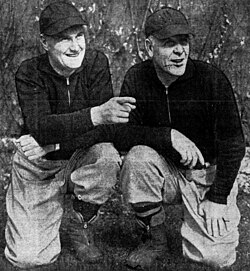 c. 1920 | |
| Biographical details | |
|---|---|
| Born | September 22, 1898 Calumet, Michigan, U.S. |
| Died | April 24, 1978 (aged 79) West Palm Beach, Florida, U.S. |
| Playing career | |
| 1918–1921 | Notre Dame |
| 1920–1921 | Canton Bulldogs |
| 1922–1923 | Chicago Bears |
| 1923 | Cleveland Indians |
| 1924–1925 | Chicago Bears |
| Position(s) | Guard |
| Coaching career (HC unless noted) | |
| 1927 | Notre Dame (assistant) |
| 1928–1929 | Saint Louis |
| 1930 | Notre Dame (line) |
| 1931–1933 | Notre Dame |
| 1934–1936 | NC State |
| 1937 | Michigan (line) |
| 1939 | Detroit Lions (assistant) |
| 1942–1945 | Chicago Bears |
| Head coaching record | |
| Overall | 34–34–4 (college) 24–12 (NFL) |
| Accomplishments and honors | |
| Awards | |
| |
| College Football Hall of Fame Inducted in 1974 (profile) | |

Heartley William "Hunk" Anderson (September 22, 1898 – April 24, 1978) was an American football player and coach. He served as the head football coach at the Saint Louis University (1928–1929), University of Notre Dame (1931–1933), and North Carolina State University (1934–1936), compiling a career college football record of 34–34–4. From 1942 to 1945, Anderson was the head coach for the Chicago Bears of the National Football League (NFL), tallying a mark of 24–12 and winning the 1943 NFL Championship.
From 1918 to 1921, Anderson played as a guard for the Notre Dame football team, under new head coach Knute Rockne. During his time in South Bend he played under an assumed name for the Canton Bulldogs in 1920–1921, but Anderson later argued that he had only played in exhibition games.[1] From 1922 to 1926, he played professionally for the Cleveland Indians and the Chicago Bears. Anderson played in 39 career games while starting in 32 of them. In 1939, he was an assistant coach for the Detroit Lions under Gus Henderson.
Born in Calumet, Michigan, on the Keweenaw Peninsula in the Upper Peninsula, Anderson attended Calumet High School. He was 5 ft 11 in (1.80 m) and weighed 170 lb (77 kg). Anderson was named to the National Football League 1920s All-Decade Team, and is one of only two players on the list not in the Pro Football Hall of Fame. He was inducted into the College Football Hall of Fame as a player in 1974.
A head coach at Saint Louis for two years, he returned to Notre Dame as an assistant under Rockne in 1930 and the Irish won all ten games. The following spring, Rockne was killed in a plane crash,[2][3][4] and Anderson was promoted to head coach ten days later.[5][6][7]
- ^ "The Taylorville Scandal" (PDF).
- ^ "Report Knute Rockne killed in plane crash". Spokane Daily Chronicle. (Washington). Associated Press. March 31, 1931. p. 1.
- ^ "Rockne's tragic death". Milwaukee Sentinel. Associated Press. April 1, 1931. p. 1A.[permanent dead link]
- ^ "Sorrow shrouds Notre Dame faculty and students with passing of Knute Rockne". Spokane Daily Chronicle. (Washington). Associated Press. April 1, 1931. p. 16.
- ^ "'Hunk' Anderson named Notre Dame coach". Milwaukee Sentinel. Associated Press. April 11, 1931. p. 23.[permanent dead link]
- ^ "Anderson named Rockne successor for year". Pittsburgh Press. United Press. April 11, 1931. p. 9.
- ^ "Hunk Anderson lacking wizardry of psychology, but is man of action". Milwaukee Sentinel. Associated Press. April 12, 1931. p. 3C.[permanent dead link]